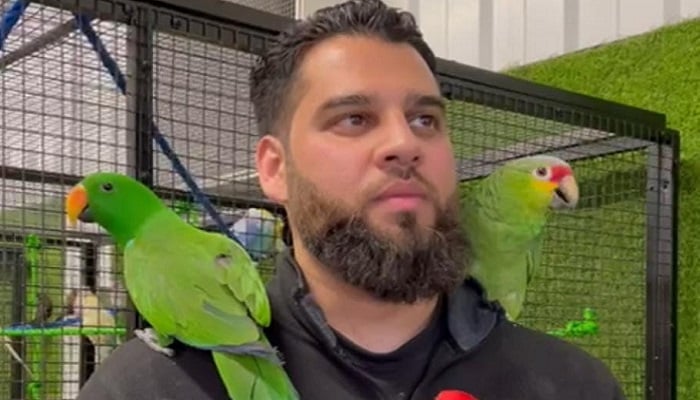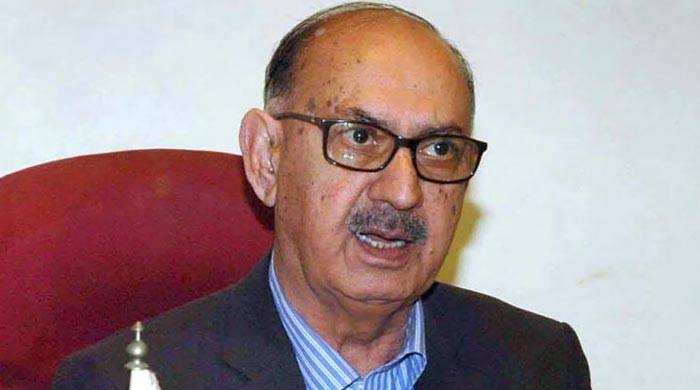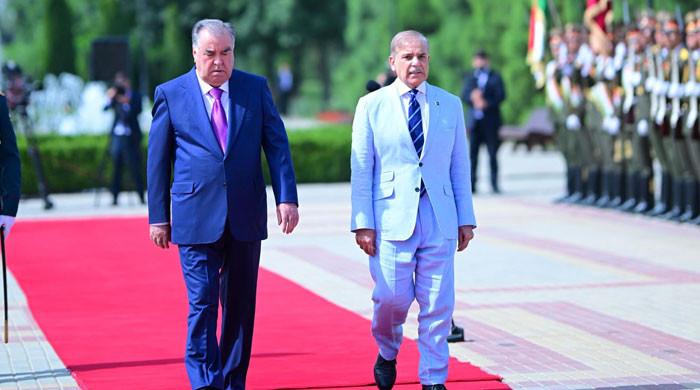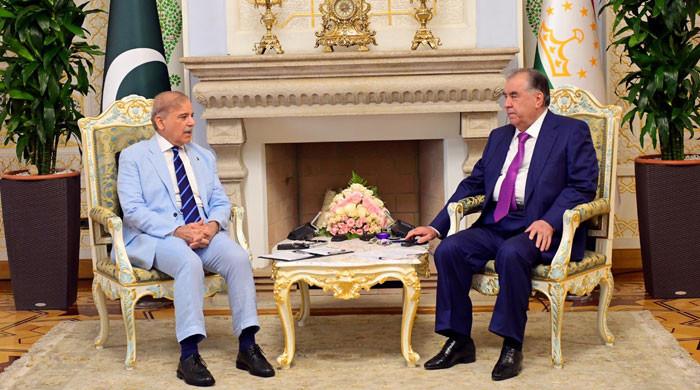British-Pakistani man pivots from aerospace engineering to raising, selling birds
Abdul Sattar Hussain, 30, turned his attention to his passion for birds during London's COVID-19 pandemic lockdown
November 18, 2021

LONDON: A British-Pakistani aerospace engineer has quit his full time engineering job to pursue his passion to breed and sell different types of birds from all over the world.
Abdul Sattar Hussain, 30, studied at the University of Hertfordshire, worked at London City Airport and then later moved to an aerospace engineering society office in central London.
During the COVID-19 pandemic lockdown, he turned his attention to selling birds from a shed in his home and soon decided to resign from his lucrative job to focus on his passion. He also started breeding birds, including the famed Pakistani mia mitthoo parrot.
Sattar started selling birds online from a residential area and soon there were customers queuing outside his house to view and buy birds. This led to the neighbours making complaints to the local council as the birds would make a lot of noise and the customers would block the driveways of the residents, as there was no space.
The engineer decided to set up a proper unit in an industrial area in East London’s Hainault area in Essex to sell birds professionally as he found the business more rewarding than his engineering job.
It wasn’t the money factor, though, that motivated Sattar to sell birds. He always had a love for animals and one of his first pets was a budgie gifted to by his mother.
How did it all start?
Sattar’s parents later bought him a blue Indian ring-neck parakeet; and like all Asians, called his parrot mithu. Sattar even took his bird to university while studying aerospace engineering and living away from home.
“The bird died suddenly after eight years of keeping him and I was heart broken. I cried so much and even today I miss him a lot. Its amazing how one can develop a bond with animals,” Sattar told Geo News in an interview.
Over some time, Sattar had a fair number of budgies, cockatiels and different parakeets. When London went into a lockdown in early 2019, Sattar started to put his birds for sale online as the numbers were getting out of control. He made adverts of birds and put them online on different selling platforms.
He said: “It got so busy, I even started to sell rabbits, guinea pigs and even chickens. I had more money coming in then my professional job would pay me every month. Now one would think that was easy; I tell you it wasn't. The neighbors complained because of the noises the animals would make, and as I was in a rented home I had no space to keep my growing collection".
He said his family, especially his wife, was very supportive of this new venture. "Eventually we had to leave. The landlord gave us an option to either get rid of my animals and stay or leave if I decide to keep them. We chose to leave and found a home where we had more space and I had the permission to keep animals," he explained.
Business picks up
After a couple of months of looking, Sattar found the ideal home with a big garden and a place where he could actually expand and have space for the animals. "We moved in and the business flourished and I even started supplying on a small level to pet shops.”
By that time, his business had grown so much that it became impossible to meet the demand from the rented home’s shed in the back garden and one room inside the main house.
He said: “The stress of constantly moving for me and my family was not healthy. Life got hard and bills were piling up as we were also instructed by estate agent to not operate a business from the new home. I decided to move again and at the same time took a lease out on a warehouse to set up a pet shop. I cannot thank Allah enough for this. He really does work in mysterious ways.”
Making it official
From his warehouse, Sattar sells small finches to big macaws now. Sattar not only sells livestock, but also advises his customers on which animal will be ideal for them.
His most popular sales are parrots due to their ability to mimic human speech and a variety of sounds. The colours on these birds are stunning. Parrots are very clever and can be taught to even do tricks.
Sattar now specialises in small birds such as finches to large birds, macaws and also has experience in rabbits and guineas pigs.
Sattar said: “Birds can be taught a lot of tricks, sounds and words. Different birds have different abilities when it comes to this. The most popular bird for speech and in the pet trade I would say is the African grey parrot that can make even the sounds of water dropping from a tap".
"I have a pet African grey parrot called mango. Mango can speak for the world. She can mimic anything and everything and is the centre of attention at home. The amazing thing is that Mango says things at the right time. If you were to drop something she would say 'chalo' in Urdu in a sarcastic way which translates to ‘come on’ in English. She is 23 years old and a character. Greys can live up to 60 to 80 years in captivity,” he said.
Sattar sells birds from the range of £15 to £20 a pair for small finches to thousands of pounds for larger parrots. Sattar added: “The most expensive bird that was ever sold was a racing pigeon that sold for $1.9 million in China in November 2020, making it the most expensive racing pigeon ever to be sold. Some larger parrots (macaws) are £15,000+ and the most expensive parrot in the world and also very rare is the Spix's macaw (current status as of April 2020, the world's rarest species of parrot is the Spix's macaw (Cyanopsitta spixii), which is listed as Extinct in the Wild according to the International Union for Conservation of Nature (IUCN) Red List. Nowadays, these rare birds, as well as other endangered species, may be sold for $200,000 or more.”











